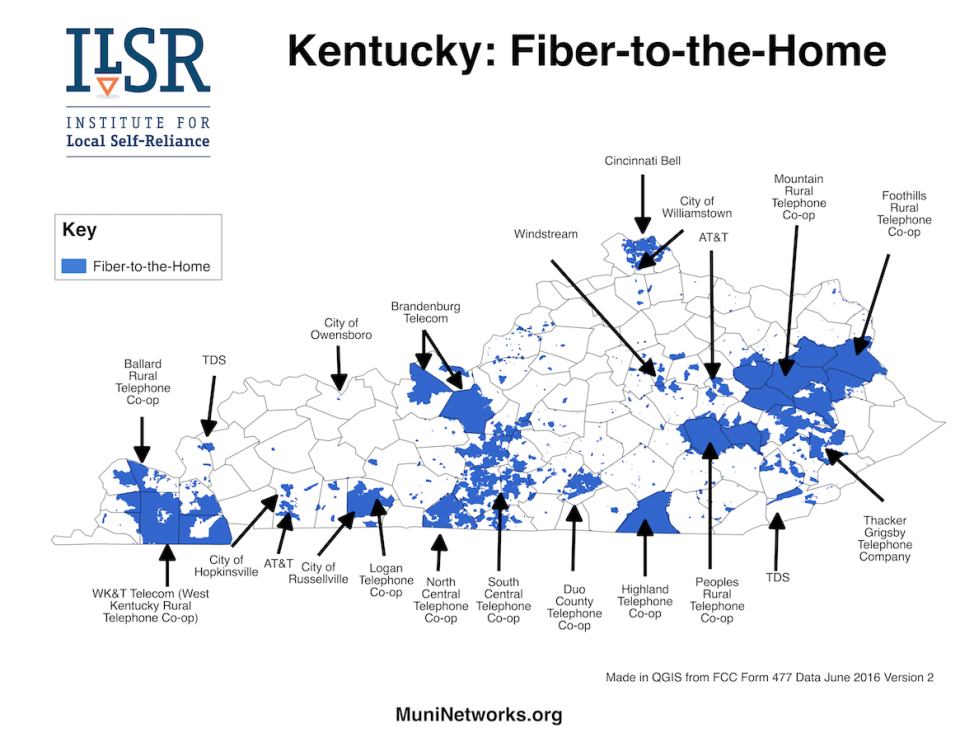
Fast, affordable Internet access for all.

From the rolling Appalachian Mountains to bustling city streets, Kentucky has it all, including gigabit (1,000 Mbps) service from Fiber-to-the-Home (FTTH) networks. That’s right, Kentucky - the state that is often used as shorthand in America politics to talk about coal country and poverty - actually has some of the fastest, most reliable Internet service in the entire country. We put together this map using the latest data sets available from the FCC to highlight how much of rural Kentucky has the gold standard in high-speed Internet service.

Cooperatives Cover Kentucky
This is just a brief snapshot using the June 2016 Federal Communications Commissions (FCC) Form 477 data set. This map shows all the FTTH infrastructure available in Kentucky according to the data submitted by ISPs. This data is reported on the census block level and may overstate coverage. Even so, the data reveals how cooperatives provide high-speed Internet service to much of rural Kentucky.
With the best intentions, Kentucky announced in late 2014 that it would build out a statewide open access fiber optic network to at least one location in each county to encourage high-quality connectivity in both urban and rural communities. Hopes were high as rural residents and businesses that depended on DSL and dial-up envisioned connectivity to finally bring them into the 21st century. After almost three years and multiple issues that have negatively impacted the project, legislators and everyday folks are starting to wonder what's in store for the KentuckyWired project.
Local Communities Are Best Suited To Deploy Community Networks
There is no one-size-fits-all method of deploying across a state filled with communities and landscapes as diverse as Kentucky. From the urban centers like Louisville and Lexington to the rocky, mountainous terrain in the southeastern Appalachian communities, demographics and geography vary widely. But most lack modern Internet access and local ISPs have found it hard to get affordable backhaul to connect to the rest of the Internet.
There are several municipal networks in Kentucky, some of which have operated for decades. In addition to Glasgow, Paducah, Bowling Green, Frankfort, and others, Owensboro is currently expanding a pilot project that proved popular. As our own Christopher Mitchell discussed at the Appalachia Connectivity Summit, several cooperatives have made major fiber-optic investments in the state.
When it comes to connecting residents and local businesses, we strongly believe local entities are the best choice. Local officials have a better sense of rights-of-way, the challenges of pole attachments, and the many other moving pieces that go into network investment. Projects with local support see fewer barriers - people are more willing to grant easements, for instance.
ILSR is excited to announce a new short video examining an impressive municipal broadband network, Glasgow Kentucky. Glasgow was the first municipal broadband network and indeed, seems to have been the first citywide broadband system in the United States.
We partnered with the Media Working Group to produce this short documentary and we have the material to do much more, thanks to the hard work of Fred Johnson at MWG and the cooperation of many in Glasgow, particularly Billy Ray.
People who only recently became aware of the idea of community owned networks may not be familiar with Billy Ray, but it was he and Jim Baller throughout the 90's and early 2000's that paved the way for all the investment and excitement we see today.
I'm excited to be helping to tell part of this story and look forward to being able to tell more of it.
In the most recent podcast from Community Matters, Fran Stoddard interviews Chris Mitchell and Billy Ray, from the Glasgow Electric Plant Board. The interview touches on the benefits of community networks, their critical role in the health of local communities, and provides info on getting a local initiative started.
Glasgow, the first municipal network in the country, pioneered the idea of the publicly owned broadband network. Billy Ray, Superintendent of Glasgow's Electric Plant Board shared a detailed account of the community's strategy in episode 74 of the Community Broadband Bits podcast. He also helped us to develop a video on the network (soon to be released!).
Community Matters also provides notes from the show, detailing questions and answers. The show runs just under an hour.

During the summer, I spent two days in Glasgow, Kentucky, to learn about the first municipal broadband network in the country. I believe it also became the first community in the US to have broadband access available universally within the town.
Working with the Media Working Group, we recorded several interviews with people there, including a lot of time with Electric Power Board Superintendent Billy Ray. Billy Ray has been a key proponent of local self-reliance and a pioneeer of community owned networks.
Below, we pulled out a few snippets of our interview talking about the origins of the Glasgow network. All of our stories about Glasgow are available here.


You may recall that we reported on Johnston's last book, The Fine Print: How big companies use plain english to rob you blind. In this short interview from On the Media called "America's Lagging Internet," Johnston and Gladstone touch on how gigantic corporate interests and their political affiliates try to put a stop to municipal networks.
The two also discuss successes in municipal networks, proposed policy changes, and how we need to recognize that access to broadband is a key to our future economic health. Johnston stresses once again how our refusal to accept the value of broadband infrastructure contributes to our slow networks, our low adoption rates, and the lack of competition.
Worth listening to!